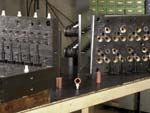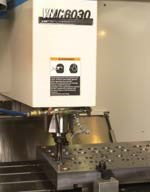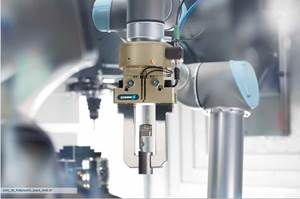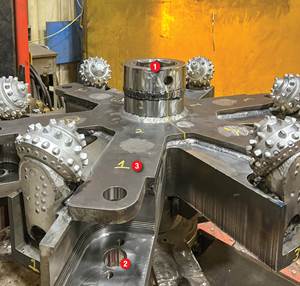VMC Machines Large Cavity Molds For Small Machines
Semco Plastic Company Incorporated (St. Louis, Missouri) manufactures an extensive line of custom injection and blow-molded thermoplastic and thermoset products from molds that are designed, machined and built at its in-house moldmaking facility.
Share





Semco Plastic Company Incorporated (St. Louis, Missouri) manufactures an extensive line of custom injection and blow-molded thermoplastic and thermoset products from molds that are designed, machined and built at its in-house moldmaking facility. Because Semco manufactures high volume plastic parts, deep-cavity and multi-cavity molds are generally required. The shop operates 24 hours a day, 5 to 7 days a week in a 400,000 square foot facility.
To keep its costs competitive, a special gate for injection molds was developed, allowing large amounts of material to fill the mold cavity without a lot of tonnage or injection pressure. This allows larger parts to run on a smaller molding machine, which is one-way Semco keeps its costs under control in a competitive market.
"Cosmetically, the parts look better because the hot tips don't show where the cavity was filled," says Jim Voelkel, co-owner. "And we don't have to trim the gate afterwards, so it reduces labor costs. But it's difficult machining a gate mold because of the tighter tolerances. The fitting and machining of the gating area is usually held within 0.005-inch tolerances."
The molds with special gates are machined on one of five VMC 6030s from Fadal (Chatsworth, California), which are useful for cutting deep molds because of a large cutting envelope, 60 inches by 30 inches by 30 inches for X, Y and Z axes. The VMC 6030 features a MP CNC control, Cool Power refrigerated cooling, box ways and a 10,000 rpm, 22.5 hp spindle with automatic mechanical hi/lo shifting for heavy aggressive steel cutting. "Compared to a dedicated moldmaking machine, the Fadals are inexpensive with a lot of bells and whistles," Mr. Voelkel says.
Often, when machining tight tolerances, vibration results from an overloaded control. This situation is caused by a combination of too many axis moves, too many tasks to be performed and too high speeds, so the machine is subjected to sudden starts and stops. The jerky motion of the machine affects surface finish and increases wear on machine tool components. The Fadal MP CNC control includes parallel processing, a processing time reduction feature that allows seven microprocessors to move 128 bits of information at one point in time, which is the equivalent of four 32-bit processors or about 3,000 blocks per second. With faster throughput, parallel processing eliminates one of the causes of vibration.
"The processing speed allows us to do a good job of surfacing—we haven't experienced any chatter problems," says Jack Moreland, senior engineer. "The control is very user-friendly; we run it off a floppy disk or direct from the computer."
According to Mr. Moreland, every upgrade for the control is purchased. Updating the control enables the VMCs to deliver machining capabilities not available when they were new. The Fadal control was designed for each axis to have a dedicated CPU and PC board and for each machine function to have its own CPU and PC board, too. As a result, the Fadal control doesn't have to be completely rebuilt to upgrade the software or hardware. Only the new PC board or memory modules have to be replaced.
By maintaining a constant temperature with a refrigerated cooling system, Fadal VMCs minimize thermal growth and repeatability problems.
The system, called Cool Power, circulates a high-performance heat transfer liquid through the spindle nose, around the spindle cartridge and headstock and through the center of the gun-drilled ballscrews. The temperature of the heat transfer agent is monitored and chilled as required, maintaining the temperature of positioning components within ±1.0 degree of the VMC's ambient temperature. Despite ambient temperature variation, parts are machined with consistent accuracy, Mr. Moreland reports. Because the system is closed-loop, chips and other contaminants are isolated from the heat transfer agent.
Other than the castings, the ways play the most important role in damping vibration. The ability of the ways to reduce vibration is directly related to surface contact area of the ways. The more surface contact area, the more vibration damping capacity. Damping increases the dynamic stiffness of the machine and therefore its stability in cutting.
"We generally cut the molds, which are made from heat-treatable tool steel at 10 to 60 ipm and hold ±0.005-inch tolerances," says Mr. Moreland. "Sometimes we machine the molds after they've been heat-treated."
Mr. Moreland has found that boxway systems provide longer life, low vibration and enable high accuracy. Because of the vibration damping characteristics of box ways, tool life is extended and the surface finish is smoother.
Related Content
Lean Approach to Automated Machine Tending Delivers Quicker Paths to Success
Almost any shop can automate at least some of its production, even in low-volume, high-mix applications. The key to getting started is finding the simplest solutions that fit your requirements. It helps to work with an automation partner that understands your needs.
Read MoreMitsui Seiki's Compact VMC Offers High-Precision Milling
The VL30 series is designed to machines high-precision mold inserts for medical, packaging, industrial and aerospace applications.
Read MoreThe Cut Scene: The Finer Details of Large-Format Machining
Small details and features can have an outsized impact on large parts, such as Barbco’s collapsible utility drill head.
Read MoreMazak VMC Provides Versatile Machining of Complex Parts
The VC-Ez 20X vertical machining center features a 25-hp 12,000-rpm CAT-40 spindle with a 30-tool-magazine automatic tool changer.
Read MoreRead Next
5 Rules of Thumb for Buying CNC Machine Tools
Use these tips to carefully plan your machine tool purchases and to avoid regretting your decision later.
Read MoreBuilding Out a Foundation for Student Machinists
Autodesk and Haas have teamed up to produce an introductory course for students that covers the basics of CAD, CAM and CNC while providing them with a portfolio part.
Read MoreRegistration Now Open for the Precision Machining Technology Show (PMTS) 2025
The precision machining industry’s premier event returns to Cleveland, OH, April 1-3.
Read More


























.jpg;maxWidth=300;quality=90)








.jpg;maxWidth=970;quality=90)